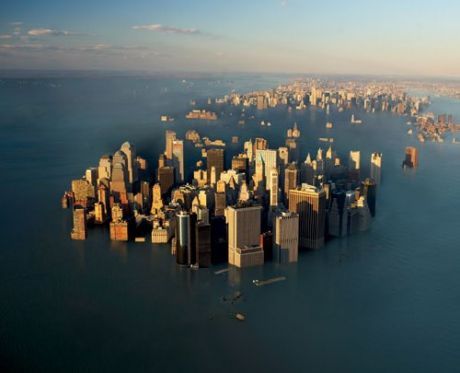News
You are here
Hundreds of cities will flood

August 24, 2013
Most of the world’s great cities are coastal, located to take advantage of transportation, trade and the oceans’ resources. Global warming will make many of these uninhabitable by the end of this century.
We have already glimpsed the future during Hurricane Sandy, when storm surges combined with higher water levels to destroy coastal communities and to flood one of the world’s richest cities: New York.
Research predicts that sea levels will rise more than two metres over the long term for every degree Celsius of global warming caused by greenhouse gas emissions. Even if all emissions stopped today, a new study shows that already locked-in warming will cause flooding that will displace some 3.6 million people in over 300 coastal towns and cities in the United States alone.
It is estimated that 10 per cent of Earth’s population–over 600 million people–live in areas that will be flooded. If emissions continue at current rates the predictions are far worse. By 2100 the state of Florida is virtually uninhabitable. Cities like Mumbai, Shanghai, Jakarta, Boston, New York, Vancouver and Halifax will require an investment of billions of dollars in defensive infrastructure.
Hurricane Sandy caused $60 billion (US) in damages. Worse is sure to come if current trends are not reversed. One analysis published in the magazine Nature predicts an annual price tag of $1 trillion per year by 2050, just to deal with flood damage in the world’s major cities. This does not take into account the human cost from loss of staple food production in coastal regions, especially rice.
According to Anders Levermann, author of the study appearing in the Proceedings of the National Academy of Science: “Continuous sea-level rise is something we cannot avoid unless global temperatures go down again. Thus we can be absolutely certain that we need to adapt. Sea-level rise might be slow on time scales on which we elect governments, but it is inevitable and therefore highly relevant for almost everything we build along our coastlines, for many generations to come.”
The threat can be mitigated with immediate action and replacement of fossil fuels with non-polluting renewable sources. But the need to produce short-term profit is essential to the capitalist economy, and trumps long-term investment in the planet’s health. The entire Harper agenda of tarsands and pipelines epitomizes the self-destruction of the system. Slowing the rising tide of destruction demands that we overturn the problem at its core, and that core is capitalism itself.
For an interactive map showing how American cities will flood over time go here.
Section:
Topics:










